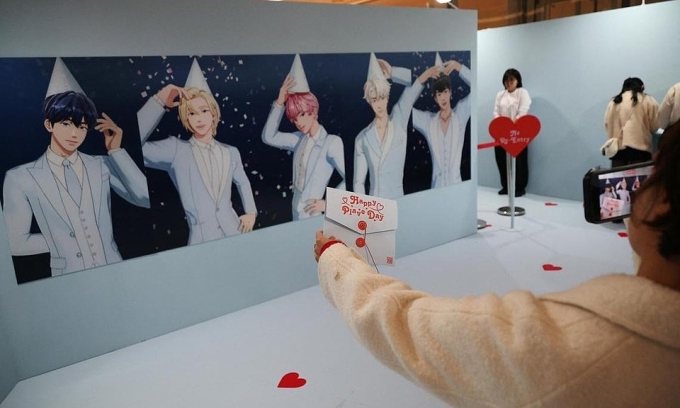By Minh Nga  September 20, 2025 | 06:00 pm PT

A fan of virtual K-pop boy band Plave takes a photos with portraits of members of Plave at a pop-up store in Seoul. Photo by Reuters
A South Korean man has been convicted of defamation for criticizing the appearance of PLAVE, a virtual boyband—the first case of its kind to go to trial.
Earlier this week, the Uijeongbu District Court in Gyeonggi Province ordered the netizen who posted the remarks to pay 500,000 won (US$358) in compensation to PLAVE, Korea JoongAng Daily reported.
Launched in 2023, PLAVE is a five-member virtual idol group whose performances are created by actors using motion-capture technology. The members appear only as animated avatars, and their real identities have not been revealed.
According to court records, in July last year the defendant posted a series of offensive comments on social media about the avatars, including: “I can’t stand the vibe of these Korean men” and “It’s not a technical issue but the main bodies’ lack of skills,” as reported by The Chosun Daily. He added that if the avatars were unattractive, the real-life performers probably were no better.
The artists behind the avatars said the comments caused emotional distress and sought 6.5 million won per person in damages, totaling 32.5 million won.
The defendant argued that because the group consists of fictional characters with undisclosed identities, defamation could not be established. The court rejected this claim, ruling that even though the images are virtual, insults targeting the avatars amount to defaming the real individuals behind them, according to The Korea Herald.
The court recognized avatars as a form of self-expression and social interaction, not merely digital images. If an avatar is widely acknowledged as representing a user, insults directed at the avatar may constitute defamation of that person. It also noted that naming the victims is not necessary if the audience understands who the comments target, and found the posts were not mere opinion but personal attacks causing psychological harm.
The decision has sparked legal debate in South Korea over the rights of digital characters. Analysts describe it as a significant shift in how the law defines harm and identity in the digital age, reflecting growing recognition of avatars as extensions of personal identity.
Virtual idols are an increasingly popular form of musical performance in South Korea and worldwide. They are represented by digital images whose movements and expressions are driven by real people using motion-capture technology. The faces and personal information of the performers are typically not disclosed, creating identities distinct from their real-life selves.
